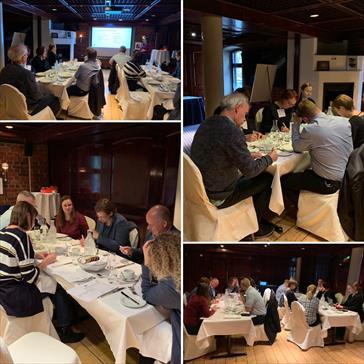The 21st meeting of the HELCOM Group for the Implementation of the Ecosystem Approach (GEAR) was held on the 6–8 November in Helsinki, Finland. The meeting was deciding on regional coordination of the EU Marine Strategy Framework Directive, steering the update of the HELCOM Baltic Sea Action Plan and planning the third HELCOM Holistic Assessment of the Status of the Baltic Sea. These are exactly the policies and assessments that project BONUS ROSEMARIE aims to write its research syntheses for.

Working and learning over lunch–BONUS ROSEMARIE researchers meet HELCOM GEAR marine policy advisors. © BONUS ROSEMARIE
Getting the right people on the right spot is not an easy task. Therefore, the HELCOM GEAR meeting offered a unique opportunity for the BONUS ROSEMARIE researchers to meet marine policy practitioners and learn how they use science in their daily work and how the project deliverables could best serve them.
As the HELCOM meeting calendar shows, meetings are not scarce. They last several days with full agendas and numerous background papers. To catch the attention of these busy people is not easy. This time the BONUS ROSEMARIE coordinator Soile Oinonen was able to fix a working session with her project and the GEAR group. Thus the learning café method was transformed to a learning lunch!
Kristin Kuhn, a PhD student of the project, explained how systematic review differs from a review and how the systematic review on the Baltic Sea ecosystem services she is leading could help in marine policy making. “I got really valuable input to focus my research. It was also a relief to realize that my research question makes sense to marine policy practitioners as well,” Kristin says.
Different valuation methods are hard to compare
Another topic of discussion was the use of monetary and non-monetary valuation methods.
Monetary valuation methods have already been used in the second HELCOM Holistic Assessment. However, as different methods provide different results, the big picture about the economic benefits from the protection and use of the Baltic Sea is hard to draw.
“It is like comparing apples and oranges,” says associate professor Cecilia Håkansson, who leads the systematic review on the valuation methods. ”Sometimes the variety of methods and their use is overwhelming even for a scientist. This meeting with the policy advisors really showed the challenge we will have in communicating to them how they could use our results.”
BONUS ROSEMARIE will package the existing science in syntheses outputs, policy briefs and animations. “This meeting really helped us to understand how policy advisors use scientific outputs. One very concrete example was that we should consider how the pictures and tables of our policy briefs could fit into the national marine strategy reports,” explains researcher Suvi Vikström, who is leading the stakeholder dialogue of the project.
BONUS ROSEMARIE was set to act as a research broker. “By understanding the knowledge needs of marine policy advisors and searching the answers from existing scientific works we do our share in ensuring evidence-based decision making. This learning lunch was a perfect example of how a project plan is put into action,” Soile Oinonen says.
Text: Soile Oinonen
More information: